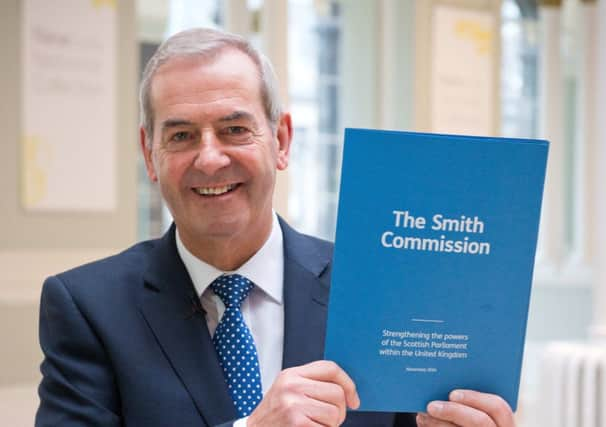Andy Maciver: Forget Smith Commission report


I’m a big tennis fan. And I like a particular type of player. For me, it’s not so much about grace, or ability, or even about winning. It’s about fight. I like the guys who don’t know when they’re beaten; who refuse to be beaten. Like André Agassi or Lleyton Hewitt. You only knew for sure they were beaten when they were lying face down in the dirt and the other guy (usually Sampras or Federer, respectively) was back in the locker room.
There’s a touch of that about the Yes movement right now – particularly the SNP. In the three months since the independence referendum, they’ve been waltzing around acting like the winners, and the actual winners have been sheepish, fractious and generally down in the dumps. Many a unionist is frustrated by this, unable to understand why the losers looks like winners and the winners look like losers.
Advertisement
Hide AdAdvertisement
Hide AdThere’s a simple answer. To return to the tennis analogy, the match is not over. The unionists won the first set 6-4, but the nationalists are running away with the second and they look like they have the stamina to go the distance.
Few unionists seem to understand why the SNP is so buoyant. Fewer still understand that the growth in the nationalist vote to 45 per cent had far more to do with the abject failure of the unionists than with any great nationalist movement.
I do not mean to disparage the nationalist campaign; though not without error, it was run by exceptional people and it was disciplined and strategic.But haven’t the unionists asked why a movement that had historically polled no more than one-third of the vote was suddenly in the lead with a week to go? If they thought about it, they would realise that the fortunes of nationalism are largely in the hands not of nationalists, but of unionists. Unionist belligerence is the key driver of nationalist success, and unionist concessions are its key dampener.
CONNECT WITH THE SCOTSMAN
• Subscribe to our daily newsletter (requires registration) and get the latest news, sport and business headlines delivered to your inbox every morning
We can see that simple truth borne out in evidence during the long campaign. When each of the three unionist parties delivered the reports of their internal commissions, the No campaign saw a boost in its poll rating of precisely nothing. Zilch. The proposals of the Liberal Democrats and the Conservatives were pushed by each party as a seismic transfer of powers, but each failed to recognise that the starting point was so low that they fell far short of meeting the aspirations of the nation. As for Labour’s final report, the less said the better.
No expert political strategy was required to see why the drift away from No and towards Yes continued – all one needed to do was to look at every single piece of polling evidence which asked people what shape they want constitutional change to take. Between 25 and 30 per cent wanted the status quo, the same wanted independence and everyone else wanted something like federalism.
It was, therefore, no surprise that when several key unionists, including Gordon Brown and George Osborne, took the rhetoric to a new level, it had the desired effect. We heard talk of a “federal-like state”, of “maximum devolution”, of a “powerhouse parliament” and of “modern home rule”, and the voters moved back towards the unionists in sufficient numbers for them to record a narrow victory.
David Cameron made the most constitutionally radical speech we have heard, perhaps ever, from a prime minister on the morning after the referendum, and it seemed that, finally, the unionists had grasped the environment in which they were operating; had understood what Scotland said when it spoke on 18 September.
Advertisement
Hide AdAdvertisement
Hide AdThree months later, it seems they do not. This was over-promise and under-delivery on a massive scale. The Smith Commission’s proposals will see Holyrood raising less than 40 per cent of what it spends. The only tax over which it will take control, in addition to income tax, will be air passenger duty, which comprises less than 1 per cent of the parliament’s expenditure.
This is not home rule. It is not federalism. It is, in effect, Calman 2. Another relatively small step in a journey into the unknown. An enduring settlement, built to stand the test of time? Utter fantasy.
The key problem remains in London. The politicians and advisers in Downing Street have shown themselves to be strategically inept, and the same would undoubtedly be the case under Labour.
They need to understand the new truism in Scottish politics. There are only two possible destinations – federalism and independence. And the further short of federalism they fall, the larger the boost it gives nationalism.
Why are nationalists waltzing around like they won? Because they’re still in the game, and they’re winning.
In a world of fantasy politics far, far away, David Cameron just made a speech to thank Lord Smith for his work but to say that it simply doesn’t answer the great question of our time. He’ll ignore it, he says. Instead, he’ll federalise the UK, starting by giving Holyrood the power to raise what it spends, before extending that to the other parts of the UK, turning the Commons into an English parliament and the Lords into an elected British senate. And the SNP stops waltzing. Game, set, match.
• Andy Maciver is a director of Message Matters
SCOTSMAN TABLET AND IPHONE APPS